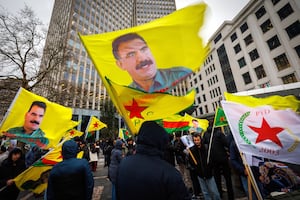The jailed leader of the Kurdistan Workers’ Party (PKK) has made his first appearance on camera in more than two decades, as he reiterated a call for the group to lay down its weapons and move towards non-violent politics.
The PKK and its “national liberation war strategy have come to an end,” Abdullah Ocalan said in a video message dated June 19 and released on Wednesday.
“I believe in the power of politics and social peace, not weapons, and I call on you to realise this principle,” Ocalan told his PKK members in the seven-minute speech.
Ocalan, whose group is designated a terrorist organisation by Turkey, the US and the European Union, has been held in a remote prison on Imrali Island in the Sea of Marmara, south of Istanbul, since being captured by Turkish security forces in 1999. The last time he appeared on camera was during his trial. In the latest video, he is seen with white hair and a fuller figure.
Ocalan founded the PKK in the 1970s. The group waged an armed insurgency against the Turkish state for decades in an attempt to secure greater rights for the country's Kurdish minority. About one-fifth of Turkey's population is ethnically Kurdish.
The conflict has killed more than 40,000 people on both sides and the PKK became Ankara's number one security priority.
Ocalan first called on PKK members to disarm and dissolve the group in February, in a move that opened the pathway to end one of the Middle East’s most intractable conflicts. At the time, his message was read out by members of Turkey’s main pro-Kurdish political party, the People’s Democracy and Equality Party (DEM).
The call came after a prolonged process initiated by an ally of Turkish President Recep Tayyip Erdogan, the ultranationalist politician Devlet Bahceli, to offer greater freedom for Ocalan in exchange for the PKK’s dissolution.
In May, the PKK agreed to dissolve, and this week said it will begin the process of disarming by destroying some of its weapons in a ceremony in Iraq’s semi-autonomous Kurdish region. Many PKK members live in mountainous areas of Kurdish-majority parts of northern Iraq.
Kurdish politicians in Turkey, who distinguish themselves from the PKK, are pushing for Ankara to move faster in what they describe as a democratisation process aimed at securing peace. The central government has framed the process as aiming to achieve a “terror-free Turkey” after more than four decades of conflict with the militant group.
Ocalan appears surrounded by members of a study group composed of other prisoners in the video. DEM party officials have previously confirmed he has been allowed to meet a small number of other prisoners in the months since the opening with Turkish authorities began.
It was not known who filmed the footage or how permission for its release was granted. DEM officials have met Ocalan in jail several times in recent months and on Monday they met Mr Erdogan for the second time in four months.
As part of the process, Kurdish politicians in Turkey are broadly calling for better prison conditions for Ocalan and the formation of a parliamentary commission to solidify the opening with the PKK in Turkish law. That could lead to amendments to the country’s anti-terrorism laws to determine the fate of current PKK members and enable their return to Turkey without legal repercussions. They also want greater rights to use the Kurdish language and an end to curbs on Kurdish political activity.

The PKK has framed its initial disarmament this week as a way of pushing for firmer action from the Turkish state on these issues. In the video, Ocalan warned against tit-for-tat demands and called on his members to lay down their weapons.
“The voluntary laying down of arms as a general part of the process and the work of the comprehensive commission to be established in the Turkish parliament, authorised by law, are important,” Ocalan said. “It is imperative to show care and sensitivity in taking steps without falling into the vicious logic, you/me first.”
The Turkish government has not spoken in great depth about the PKK dissolution process, but senior officials have generally voiced support for its continuation.
"There is, and cannot be, any step in the terror-free Turkey efforts that would tarnish the memory of our martyrs or hurt their spirits," Mr Erdogan said on Wednesday in remarks to MPs from his ruling Justice and Development Party (AKP). He previously said the process “will gain momentum once the terrorist organisation begins to implement its decision to lay down arms".
Turkish intelligence chief Ibrahim Kalin travelled to the Iraqi capital Baghdad on Tuesday, where the process of the PKK’s dissolution and disarmament was the main agenda item in his meetings with senior Iraqi officials, Turkish state broadcaster TRT reported.
While most of the PKK members in Iraq live in areas under control of the semi-autonomous Kurdistan Regional Government, the Turkey-Iraq border security forces are under federal control, and Ankara appears keen to have central buy-in for the process.


